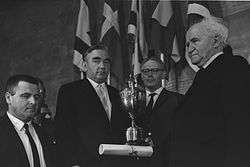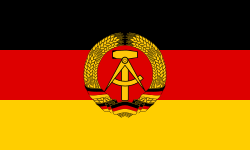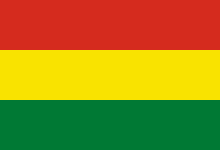16th Chess Olympiad
The 16th Chess Olympiad, organized by FIDE and comprising an open[1] team tournament, as well as several other events designed to promote the game of chess, took place between November 2 and November 25, 1964, in Tel Aviv, Israel.



The Soviet team with 6 GMs, led by world champion Petrosian, lived up to expectations and won their seventh consecutive gold medals, with Yugoslavia and West Germany taking the silver and bronze, respectively.
Results
Preliminaries
A total of 50 teams entered the competition and were divided into seven preliminary groups of seven or eight teams each. The top two from each group advanced to Final A, the teams placed 3rd-4th to Final B, no. 5-6 to Final C, and the rest to Final D. All preliminary groups and finals were played as round-robin tournaments. The preliminary results were as follows:
- Group 1: 1. Soviet Union, 2. Spain, 3. Philippines, 4. Chile, 5. Switzerland, 6. Venezuela, 7. South Africa.
- Group 2: 1. Yugoslavia, 2. Netherlands, 3. Mongolia, 4. Austria, 5. Mexico, 6. India, 7. Bolivia.
- Group 3: 1. Hungary, 2. Israel, 3. Sweden, 4. Scotland, 5. France, 6. Ireland, 7. Luxembourg.
- Group 4: 1. United States, 2. Poland, 3. England, 4. Norway, 5. Turkey, 6. Iran, 7. Portugal.
- Group 5: 1. Romania, 2. Czechoslovakia, 3. Cuba, 4. Paraguay, 5.Colombia, 6. Puerto Rico, 7. Australia.
- Group 6: 1. Argentina, 2. Canada, 3. East Germany, 4. Ecuador, 5. Monaco, 6. Ireland, 7. Uruguay.
- Group 7: 1. Bulgaria, 2. West Germany, 3. Denmark, 4. Peru, 5. Finland, 6. Greece, 7. Dominican Republic, 8. Cyprus.
With Australia making its debut, this was the first Olympiad where all six continents were represented.
Final
Final A # Country Players Points MP Head-
to-head1 
Petrosian, Botvinnik, Smyslov, Keres, Stein, Spassky 36½ 2 .svg.png)
Gligorić, Ivkov, Matanović, Parma, Udovčić, Matulović 32 3 
Unzicker, Darga, Schmid, Pfleger, Mohrlok, Bialas 30½ 4 
Portisch, Szabó, Bilek, Lengyel, Forintos, Flesch 30 5 
Pachman, Filip, Hort, Kaválek, Jansa, Blatný 28½ 6 
Reshevsky, Benko, Saidy, Bisguier, Byrne, Addison 27½ 7 .svg.png)
Padevsky, Tringov, Bobotsov, Popov, Milev, Spiridonov 27 13 3 8 .svg.png)
Ghițescu, Gheorghiu, Ciocâltea, Radovici, Mititelu, Botez 27 13 1 9 
Eliskases, García, Schweber, Wexler, Cruz 26 10 
Doda, Bednarski, Śliwa, Filipowicz, Balcerowski, Schmidt 24 11 
Kuijpers, Bouwmeester, Langeweg, Zuidema, Prins 21 12 .svg.png)
Yanofsky, Anderson, Vranesic, Macskasy, Suttles, Witt 19 13 .svg.png)
Pomar, Medina García, Saborido, Menvielle Lacourrelle, Mora, Pérez Gonsalves 17½ 5 14 
Porath, Kraidman, Domnitz, Aloni, Guthi, Stepak 17½ 3
Final B # Country Points MP 15 
38½ 16 
32 17 
31½ 18 
31 19 
27½ 15 20 
27½ 14 21 
26 22 
25½ 14 23 .svg.png)
25½ 13 24 
24 25 .svg.png)
22½ 26 
18 27 .svg.png)
17½ 28 
17
Final C # Country Points MP 29 
37½ 30 
36½ 31 
35 24 32 
35 19 33 .svg.png)
30½ 34 
29½ 35 .svg.png)
27½ 36 .svg.png)
23½ 37 
22 38 .svg.png)
21½ 39 
20½ 40 .svg.png)
20 41 
13 42 
12
Final D # Country Points 43 .svg.png)
22½ 44 .svg.png)
18 45 
15½ 46 
14½ 47 
14 48 
12 49 
10½ 50 .svg.png)
5
Individual medals
- Board 1:

- Board 2:
.svg.png)
- Board 3:

- Board 4:


.svg.png)
- 1st reserve:

- 2nd reserve:
.svg.png)

At the other end of the spectrum, Milton Ioannidis of Cyprus lost all of his 4 games, giving him a total score at the Olympiads of 0 / 24 = 0.0%.
References
- Although commonly referred to as the men's division, this section is open to both male and female players.
- 16th Chess Olympiad: Tel Aviv 1964 OlimpBase